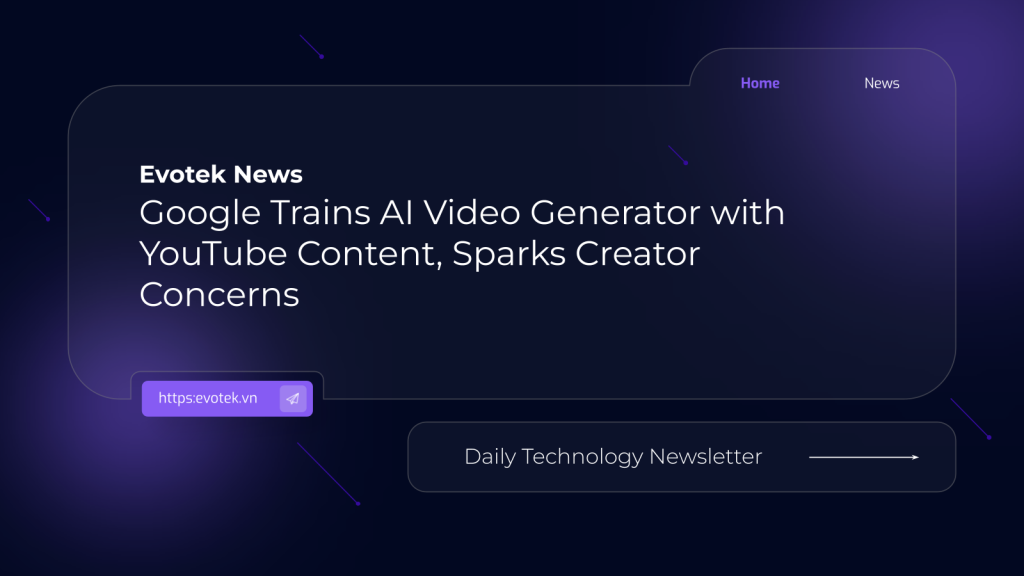Google is leveraging its vast YouTube library to train its artificial intelligence models, including Gemini and the cutting-edge Veo 3 video and audio generator. This revelation has sparked debate and raised concerns among content creators and media companies regarding intellectual property rights.
YouTube’s AI Training Practices
CNBC reports that Google confirmed using a portion of YouTube’s extensive video collection to enhance its AI capabilities. While Google assures that it honors agreements with creators and media companies, the lack of widespread awareness about this practice is causing unease. A YouTube spokesperson stated, “We’ve always used YouTube content to make our products better, and this hasn’t changed with the advent of AI.” They also emphasized investments in protections for creators’ image and likeness in the AI era.
Potential IP Crisis and Creator Concerns
Experts warn that utilizing YouTube videos for AI training could lead to an intellectual property crisis. Despite YouTube’s claims of transparency, many creators and media organizations remain unaware that their content is being used to train Google’s AI models. The scale of YouTube’s library is significant. Even training on a small percentage of its 20 billion videos would dwarf the training data used by competing AI models.
Luke Arrigoni, CEO of Loti, highlights the potential unfairness to creators: “It’s plausible that they’re taking data from a lot of creators that have spent a lot of time and energy and their own thought to put into these videos… It’s helping the Veo 3 model make a synthetic version, a poor facsimile, of these creators.”
Veo 3 and the Future of Content Creation
The announcement of Veo 3, Google’s advanced AI video generator, in May has intensified these concerns. Veo 3 can generate cinematic-quality video sequences with AI-generated visuals and audio. Many creators worry that they are inadvertently contributing to a system that could ultimately compete with or even replace them. Experts emphasize that even if Veo 3’s output doesn’t directly replicate existing work, it could fuel commercial tools that rival creators, without providing credit, consent, or compensation.
YouTube’s Terms of Service
YouTube’s terms of service grant the platform a broad license to use uploaded content: “By providing Content to the Service, you grant to YouTube a worldwide, non-exclusive, royalty-free, sublicensable and transferable license to use that Content.”
Dan Neely, CEO of Vermillio, points out the rise of fake versions of creators and the potential for misuse of likenesses. Vermillio employs a tool called Trace ID to assess the overlap between AI-generated and human-created videos, providing scores that indicate meaningful similarity.
Example: Brodie Moss Video
In one instance, a video from YouTube creator Brodie Moss closely matched content generated by Veo 3. Vermillio’s Trace ID assigned a score of 71 to the original video, with the audio alone scoring over 90.
Creator Perspectives and Google’s Response
Some creators, like Sam Beres, express optimism and view AI as “friendly competition.” Google offers an indemnification clause for its generative AI products, including Veo, assuming legal responsibility for copyright challenges related to AI-generated content.
YouTube has partnered with Creative Artists Agency to help talent manage AI-generated content featuring their likeness. They also provide a tool for creators to request takedowns of videos that abuse their likeness.
However, concerns remain about the reliability of these tools and the inability of users to prevent Google from using their content to train its own AI models. While creators can opt out of third-party AI training with companies like Amazon, Apple, and Nvidia, this does not apply to Google’s own AI initiatives.
Legal Challenges and Future Implications
The use of AI in content creation is facing legal scrutiny. The Walt Disney Company and Universal recently filed a lawsuit against the AI image generator Midjourney, alleging copyright infringement.
Sen. Josh Hawley has emphasized the need to protect artists and creators’ rights in the face of AI replication technologies.
Disclosure: Universal is part of NBCUniversal, the parent company of CNBC.

 日本語
日本語 한국어
한국어 Tiếng Việt
Tiếng Việt 简体中文
简体中文